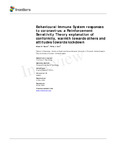Behavioural Immune System responses to coronavirus: a Reinforcement Sensitivity Theory explanation of conformity, warmth towards others and attitudes towards lockdown
| dc.contributor.author | Bacon, Alison | |
| dc.contributor.author | Corr, PJ | |
| dc.date.accessioned | 2020-10-27T12:14:50Z | |
| dc.date.issued | 2020-11-26 | |
| dc.identifier.issn | 1664-1078 | |
| dc.identifier.issn | 1664-1078 | |
| dc.identifier.other | 566237 | |
| dc.identifier.uri | http://hdl.handle.net/10026.1/16602 | |
| dc.description | Embargo removed due to subject matter. | |
| dc.description.abstract |
Behavioural immune system (BIS) describes psychological mechanisms that detect cues to infectious pathogens in the immediate environment, trigger disease-relevant responses and facilitate behavioural avoidance/escape. BIS activation elicits a perceived vulnerability to disease (PVD) which can result in conformity with social norms. However, a response to superficial cues can result in aversive responses to people that pose no actual threat, leading to an aversion to unfamiliar others, and likelihood of prejudice. Pathogen-neutralizing behaviours, therefore, have implications for social interaction as well as illness behaviours and responses to health communications. In this study, we investigate how PVD influences conformity, attitudes to other people and to lockdown regulations through the lens of the Reinforcement Sensitivity Theory (RST). RST describes personality in terms of biologically-driven approach and avoidance motivations which support personal goals. Participants from the UK public (N = 605) completed an RST personality questionnaire and then read either (a) coronavirus morbidity-mortality statistics and current UK government lifestyle regulations, (b) just the regulations (as presented in most government publicity materials), or (c) no information at all. They all completed the Perceived Vulnerability to Disease scale to assess BIS-relevant Germ Aversion and Perceived Infectability, followed by questions measuring social conformity, warmth towards others and attitudes towards lockdown measures. Significantly lower PVD scores were observed in the no-information condition, with the other conditions showing no difference. In terms of RST, approach behaviours related to goal-drive persistence work alongside fear in explaining conformity to social norms. Reward related approach behaviours partially explained warmth towards others, indicating that social rewards gained through interaction continue to be strong drivers of behaviour. We found no role for RST traits in attitudes towards lockdown. Overall, coronavirus-related behaviour is not driven purely by fear, but also by social and/or protection goals regulated by approach motivation. This study presents new insights into public perceptions of coronavirus and government regulated lifestyle restrictions, helping to explain social behaviours in terms of biologically driven mechanisms. Such understanding is vital if we are to successfully motivate public behaviour to constrain spread of the virus. | |
| dc.format.extent | 566237- | |
| dc.format.medium | Electronic-eCollection | |
| dc.language | eng | |
| dc.language.iso | en | |
| dc.publisher | Frontiers Media | |
| dc.subject | reinforcement sensitivity theory (RST) | |
| dc.subject | COVID-19 | |
| dc.subject | coronavirus | |
| dc.subject | perceived vulnerability to disease (PVD) | |
| dc.subject | behavioral immune system | |
| dc.subject | conformity | |
| dc.title | Behavioural Immune System responses to coronavirus: a Reinforcement Sensitivity Theory explanation of conformity, warmth towards others and attitudes towards lockdown | |
| dc.type | journal-article | |
| dc.type | Journal Article | |
| plymouth.author-url | https://www.webofscience.com/api/gateway?GWVersion=2&SrcApp=PARTNER_APP&SrcAuth=LinksAMR&KeyUT=WOS:000597663700001&DestLinkType=FullRecord&DestApp=ALL_WOS&UsrCustomerID=11bb513d99f797142bcfeffcc58ea008 | |
| plymouth.issue | 11 | |
| plymouth.volume | 11 | |
| plymouth.publication-status | Published online | |
| plymouth.journal | Frontiers in Psychology | |
| dc.identifier.doi | 10.3389/fpsyg.2020.566237 | |
| plymouth.organisational-group | /Plymouth | |
| plymouth.organisational-group | /Plymouth/Faculty of Health | |
| plymouth.organisational-group | /Plymouth/Faculty of Health/School of Psychology | |
| plymouth.organisational-group | /Plymouth/REF 2021 Researchers by UoA | |
| plymouth.organisational-group | /Plymouth/REF 2021 Researchers by UoA/UoA04 Psychology, Psychiatry and Neuroscience | |
| plymouth.organisational-group | /Plymouth/REF 2021 Researchers by UoA/UoA04 Psychology, Psychiatry and Neuroscience/UoA04 REF peer reviewers | |
| plymouth.organisational-group | /Plymouth/Research Groups | |
| plymouth.organisational-group | /Plymouth/Research Groups/Centre for Brain, Cognition and Behaviour (CBCB) | |
| plymouth.organisational-group | /Plymouth/Research Groups/Centre for Brain, Cognition and Behaviour (CBCB)/Behaviour | |
| plymouth.organisational-group | /Plymouth/Research Groups/Plymouth Institute of Health and Care Research (PIHR) | |
| plymouth.organisational-group | /Plymouth/Users by role | |
| plymouth.organisational-group | /Plymouth/Users by role/Academics | |
| dc.publisher.place | Switzerland | |
| dcterms.dateAccepted | 2020-10-27 | |
| dc.rights.embargodate | 2020-11-27 | |
| dc.identifier.eissn | 1664-1078 | |
| dc.rights.embargoperiod | Not known | |
| rioxxterms.versionofrecord | 10.3389/fpsyg.2020.566237 | |
| rioxxterms.licenseref.uri | http://www.rioxx.net/licenses/all-rights-reserved | |
| rioxxterms.licenseref.startdate | 2020-11-26 | |
| rioxxterms.type | Journal Article/Review |


